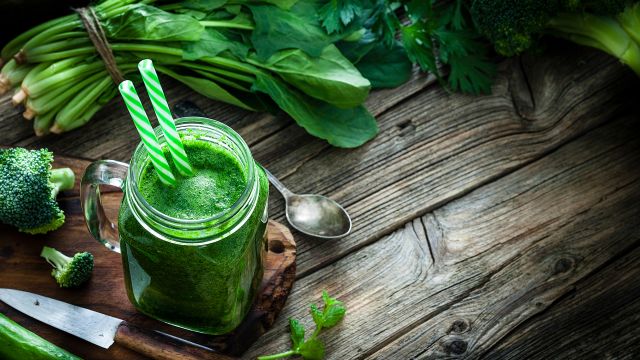Updated on March 26, 2025.
With all that you read about body “detoxes” and “cleanses," you’d think there must be a medical need to help rid your body of harmful substances. But you’d be wrong, says Lauri Watson, RD, a registered dietitian in Summerville, South Carolina.
Before you buy into an expensive cleanse or detox—whether it’s a product or a service—learn how your body performs these functions naturally, and whether it really needs the help.
How your body naturally detoxes itself
Your body has the natural ability to cleanse itself, Watson explains. There are a number of organs involved in the complex process of waste management. "The liver is the body's main cleaner, but our nose and our mouth help with filtering the air," Watson says. "Even the hair on our skin and our lungs help filter out toxins," she adds.
The liver plays a major role in our natural body detox system, acting as a filter to ensure that harmful substances are removed from the bloodstream. With help from your digestive organs and kidneys, these substances are then expelled from the body through urine and stool, says Watson.
Often, commercial detoxes claim to aid these natural functions—sometimes in an unsafe way. And that's where you can run into trouble.
Detoxes to avoid
There are many different kinds of detoxes and cleanses. They may involve fasting, drinking certain beverages, eating certain foods, or using a supplement or herb to help clear supposedly hazardous chemicals from the body. Some of the approaches are dangerous.
Some detox programs rely on enemas and laxatives to cleanse your system, for example. Steer clear of these. Enemas involve your rectum being injected with liquid and using them can become a harmful habit. "Enemas put pressure on the colon, and can cause physical harm, like bleeding and infection," Watson says. "One could imagine it being awfully uncomfortable, and probably not something that's needed," she adds.
Laxatives are over-the-counter drugs that encourage bowel movements. Like enemas, they can cause your body to release too much water, leading to dehydration. This can disrupt your body’s chemical balance. Some people can become dependent on laxatives, to the point where they can't move their bowels without them, says Watson.
Many cleanses may also be unsafe—especially extreme diet cleanses that purport to rid your body of toxins. Cleanses that severely restrict calories and nutrients the body needs to properly function can cause symptoms like nausea, dizziness, fatigue, and impaired thinking.
Some detox or cleanse products are actually designed to fool you into thinking they’re working by changing the color or consistency of your stool, Watson says.
Boosting your body's detox process
Your body’s detox process is practically foolproof, and if it's functioning correctly, few products can improve upon the filtering it performs as a matter of course. To help keep your system in shape, Watson recommends consuming a diet rich in whole foods. "Eating a whole food and plant-based diet can be very cleansing to the body," she notes.
Staying well-hydrated also helps the immune system and organs to work at optimum levels, which supports your body’s natural detoxification process. The fluids, fiber and antioxidants found in fresh whole foods bolster this activity. However, people who have a chronic disease for which they need to restrict fluids should beware of hydrating too much; speak with your healthcare provider (HCP) for more information.
Examine your reasons for detoxing
There are a number of reasons a person may be interested in a detox in addition to flushing harmful substances from the body, Watson suggests. They may include quick weight loss, constipation relief, increased energy, or a general improvement in overall health and well-being.
When people desire results like these, they often need a lifestyle change—not a quick-fix detox. That means focusing on more than just food. "Movement and exercise help to get the blood flowing, and it help keep things moving and working their best," Watson says.
If you do plan on changing your health habits considerably or restructuring your diet, speak with your HCP or another medical professional—especially if you have a pre-existing health condition. "You're going to want to look for a registered dietician in your community for advice," Watson says. She recommends finding a dietitian online at the Academy of Nutrition and Dietetics.
The bottom line: your body is well-adapted to naturally detoxing and cleansing itself. Adopting healthy habits—eating whole, largely plant-based foods (buy responsibly grown foods; wash veggies and fruits well), staying well hydrated, limiting alcohol, and adding physical activity to your daily routine—can support your natural detox process. Products or services that claim to detox or cleanse your system could be harmful and a waste of your money.






